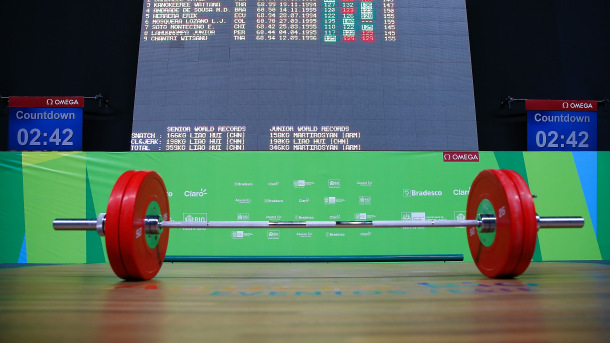The International Weightlifting Federation (IWF) Executive Board has banned the entire Russian weightlifting team from participating in the 2016 Summer Olympic in Rio de Janeiro, Brazil. The IWF cited past and present doping violation by 6 out of 8 of the nominated weightlifters as the primary reason behind its decision to keep the Russian team out of Rio. This means that 2 athletes who have never been implicated in a steroid or doping scandal have also been banned.
“The integrity of the weightlifting sport has been seriously damaged on multiple times and levels by the Russians, therefore an appropriate sanction was applied in order to preserve the status of the sport,” according to a statement released by the IWF.
The IWF decision was announced on July 29, 2016. This was only one week prior to the Summer Olympics Opening Ceremony in Maracanã Stadium. However, the IWF was not necessarily at fault for the late decision.
Only 5 days earlier, the International Olympic Committe (IOC) announced its refusal to issue a blank ban to prevent all Russian athletes from competing. Instead, the IOC passed on the responsibility for this decision to each of the 28 sports federations represented in the Olympics.
The IOC has come under heavy criticism for passing the buck to the individual sports federations at the very last minute. IOC president Thomas Bach insisted that his organization was not to blame for throwing the Olympics into disarray. Bach pointed the finger at the World Anti-Doping Agency (WADA)
“The IOC is not responsible for the timing of the McLaren report (into Russian doping),” Bach said. “The IOC is not responsible for the fact that information offered to the World Anti-Doping Agency a couple of years ago has not been followed up; the IOC is not responsible for accreditation or supervision of the anti-doping laboratories.’’
“So, therefore, the IOC cannot be made responsible either for the timing or for the reasons of these incidences we have to face now and have to address just a couple of days before the Games.”
Bach referred to WADA’s publication of the Independent McLaren Investigation Report on July 18, 2016. Western University law professor Richard McLaren was hired by WADA to investigate allegations made by former Russian Anti-Doping Agency (RUSADA) director Grigory Rodchenkov
Rodchenkov claimed that RUSADA organized a state-sponsored doping system that provided athletes with an undetectable cocktail of three different anabolic steroids – methenolone (Primobolan), trenbolone and oxandrolone (Anavar). In addition, Rodchenkov claimed that the Russian intelligence service Federal Security Service of the Russian Federation (FSB) helped cover up evidence of doping at the 2014 Sochi Winter Olympic Games.
The McLaren Report validated almost every single claim made by Rodchenkov often with little to no corroborating evidence. While the standard of evidence used by The McLaren Report would fail to stand up in most courts of law, it was enough to give credibility to Rodchenkov’s claims. Consequently, the IWF relied on the McLaren Report to justify its suspension of the Russian weightlifting team.
The Russian Olympic Committee (ROC) nominated 8 weightlifters to compete in the Rio Olympics. Two nominations – Tatiana Kashirina’s and Anastasiia Romanova – were withdrawn since the athletes had previously been suspended from weightlifting competition.
Four additional athletes were linked to potential anti-doping violations after the McLaren Report identified them as beneficiaries of the “Disappearing Positive Methodology System” (DPMS). The DPMS involved the switching out of steroid-contaminated samples in exchange for clean samples.
The IWF also cited the recent results of the IOC reanalysis of samples from the 2008 Beijing Olympics and the 2012 London Olympics as a reason for completing barring the Russian team from the Olympics. After the first wave of testing had been completed, at least 7 Russian weightlifters were found guilty of doping. The IWF feared the number could increase after all four waves of reanalysis are completed.
The IWF became only the second international sports federation to issue a blanket ban on all Russian athletes in its particular sport. The International Association of Athletics Federations (IAAF) was the first federation to categorically ban all track and field athletes from Russia.
Most other international sports federations have decided to give a pass to most of the nominated Russian athletes. Sports Minister Vitaly Mutko reported that international sports federations have approved at least 272 out of 387 nominated Russian athletes.
Russian Olympic weightlifter Aleksey Lovchev promised local media that Russia would work hard to rehabilitate its image in the face of the Olympic ban.
“The [Russian Weightlifting] Federation will do everything in its power to rehabilitate us, but it is impossible to do it before the Olympics; there is no time to do anything,” Lovchev said.
Lovchev became the “strongest man in the world” when he set the world records with a 264 kilogram clean-and-jerk and a 475 kilogram total (combination of the snatch and the clean-and-jerk) at the 2015 IWF World Weightlifting Championships in Houston in November 2015. Unfortunately, the 309-pound Russian weightlifter was suspended for 4 years this year after the in-competition drug test in Houston turned up traces of the injectable growth hormone releasing peptides (GHRPs) known as ipamorelin. Lovchev now has all the time in the world to “rehabilitate” the image of Russian weightlifting.

